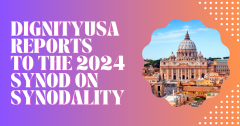Breath of the Spirit: Authentic Love: The Fire that Separates also Gathers

Today’s scriptures remind us the love that gathers also separates. Love has consequences. When our selfishness gets in the way, we can distance ourselves from the call and community of Love, but this is never our destiny. Instead, authentic discipleship always invites and develops authentic community. Each of today’s readings reminds us that authenticity is not easy, but it is less of a burden – and more rewarding – when we practice it together.
August 14, 2022: Twentieth Sunday in Ordinary Time
Jeremiah 38:4-6; 8-10
Psalm 40:2, 3, 4, 18
Hebrews 12:1-4
Luke 12:49-53
Authentic Love: The Fire that Separates also Gathers
A reflection by Jon Schum
Just shy of four months ago we heard the Easter account wherein the Risen Christ appeared to the disciples “on the evening of the first day of the week.” The very first Easter greeting of Christ was “Peace be with you.” We treasure these words and repeat them to one another at every eucharistic celebration. And then we have the gospel for today: “Do you think I have come to establish peace on earth? No, I tell you, but rather division.”
So, in what situation do we find our gentle, reassuring Savior who, in this instance, speaks of troubling times and human divisions? Keep in mind that this passage is a continuation of last Sunday’s gospel. Jesus’ confrontation with the Pharisees left him open to the deadly risks of proclaiming a message that alarmed the political and religious establishment (Luke 11). Jesus’attention turns to his followers to assure them of God’s protection even under persecution. Jesus urges them to guard against greed and to trust divine providence (“you are worth more than many sparrows”). They should seek the ways of God and be ever vigilant (12.35-40).
There is clear resolve and urgency in Jesus’ message. Jesus sees the proclamation of the reign of God as a refining and purifying fire. Jesus’ hopes for his ministry and message are deep and profound, and Jesus is totally consumed with intimacy for Abba-God and for the definitive and full establishment of God’s reign. Some are inclined to interpret this fire as one of divine love. But fire imagery in Luke-Acts has a different focus: cleansing, judgment, and new beginnings.Subsequently, the Spirit’s refining fire at Pentecost marked the disciples’ full embrace of the gospel and the beginning of the Jesus movement that would lead to the formation of Christian communities and a universal body of believers.
The crowds that gathered around Jesus reacted in different ways to his message. Those considered public sinners, outcasts, and outsiders found new life in the loving embrace of this teacher who healed their brokenness and joined them at table. These were the beloved poor in spirit who welcomed the good news. The rich official (Luke 18:18-23) epitomizes those who could not free themselves from possessions and power to shoulder the gospel challenge. Parables such as the Rich Man and Lazarus, (Lk 16), the Pharisee and the Tax Collector (Lk 18), the Rich Fool (Lk 12) and the Great Feast (Lk 14) depict self-destructive outcomes for those who are consumed with themselves. Then there were many “in between,” including the disciples, who were known to argue among themselves who was the most important. The cleansing Pentecost fire of the Holy Spirit awaited them.
Jesus understands that the very nature of accepting and living the gospel will cause divisions that will reach even into the intimacy of family relationships. He faced these in his own ministry (Mark 3.21-22). We nod our heads in agreement, given the brokenness of our political dialogue today. Many of us have stories of family estrangements over polarizing issues. But what Jesus had in mind were not just thoughtful political viewpoints, but the very orientation of our ethical selves, our core gospel-based beliefs that we strive to integrate into daily decisions. LGBTQIA+ persons take the risk of coming out to family and friends because we know at the very center of our being that we are who we are, formed in the divine image, and God’s beloved. The call to authenticity can unify, but it can also separate.
In that vein, the account of Jeremiah the prophet is aptly paired with today’s gospel. Jeremiah was among the most oppressed and beleaguered of prophets, and a complex figure who argued with God, suffered public scorn, frequent imprisonment, and physical abuse, and yet was often consulted by the king for advice. Remembered as “the weeping prophet,” he is a powerful symbol of a suffering community.
The historical setting of today’s reading is about 600 years BCE, during the reign of a weak and desperate King Zedekiah. The Babylonian army is laying siege to the holy city and Jeremiah has counseled the king to accept the inevitable and surrender. Army officers are offended by this and, with the timid king’s permission, imprison Jeremiah in an empty cistern, where he dramatically “sank into the mud.” Imagine the darkness, the terror, the fright.
Onto this scene comes an expected rescuer. Ebed-melech, an Ethiopian and a court eunuch, intervenes with Zedekiah to free Jeremiah from the cistern. In her commentary, Julianna M. Claassens (The Paulist Biblical Commentary, p. 703) notes Ebed-melech’s ethnic and sexual identity as an outsider in the community, suggesting that they had likely experienced a share of exclusion and hardship and they are the one to notice the injustice done to Jeremiah. Ebed-melech organizes a team of thirty attendants to pull the prophet out of the mud. Professor Claassens adds that this timeless salvation story speaks of hope and opens the possibility that salvation and liberation are possible when things are most dire. Salvation can come in the most unexpected places from the most unexpected persons. As is so typical in the Scriptures, those from outside the halls of power gather around the call to authenticity while the powerful seek to silence its voice with separation.
The Letter to the Hebrews is not an epistle, but a long sermon, and offers a similar call to gather as a community grounded in authenticity. It was designed to be delivered in front of an assembly not of Jewish believers, but of Christians. The unnamed author was possibly an itinerant apostle well known to their listeners. It is the only New Testament writing to assign the titles of “priest” and “high priest’ to Jesus.
The audience seems to be one of long-standing believers, who are urged “to hold fast to the confession of faith” (4:14). Perhaps there is some weariness with the demands of Christian living, so a “footrace” analogy encourages them to “run with perseverance the race laid out for us…to think of Jesus, “who endured the cross…and who endured opposition from sinners so that you will not grow weary and lose heart.” The implication being that we will run with greater fidelity if we run together.
How essential it is that we support, accompany, and stand in public solidarity with the prophets in our midst. We are, after all, one prophetic community and one voice, part of a “great cloud of witnesses” (Hebrews 12:1). This cloud, an image both heavenly and earthly, includes the heroes who have gone before us as well as our present-day companions who urge us onward by their collective authenticity, witness, prayer, and loving support. And, of course, that great cloud of witnesses includes you and me, and all of us, who “run the good race” and labor to fashion the world God desires for all creation.

Jon Schum and his husband Ron Lacro are longtime Dignity Boston members. Jon has served on its board and liturgy committee and is one of the chapter's ordained presiders. For many years he supervised and provided arts-based therapeutic programming for an elder services agency in Boston. He is currently a co-facilitator of the Aging with Dignity caucus.





